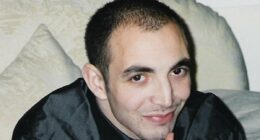Share this @internewscast.com
A ubiquitous children’s book author suffering from dementia and Parkinson’s disease has announced that he will die by physician-assisted suicide.
Robert Munsch, author of 85 books including the beloved The Paper Bag Princess, sought and received Medical Assistance in Dying from the Canadian government following his dementia diagnosis in 2021, as reported by The New York Times.
Under Canadian law, passed in 2016, patients don’t need to be terminally ill to opt for euthanasia. Munsch humorously described the application process to the Times as saying, ‘Hello Doc- come kill me!’ and jokingly asked, ‘How much time do I have? Fifteen seconds!’
The 80-year-old said he was convinced he made the right decision after watching one of his brothers die of Lou Gehrig’s disease.
‘They kept him live through all these interventions,’ he recounted. ‘I thought: Let him die.’
Munsch added that he will choose to die ‘when I start having real trouble talking and communicating. Then I’ll know.’
According to Canada’s MAID law, the individual must consent at the time of death, requiring Munsch to ‘choose the moment when I can still request it.’
If he misses that opportunity, he told his wife, Ann, ‘you’re stuck with me being a lump.’

Robert Munsch, 80, has announced he will die by physician assisted suicide

The ubiquitous author is known for traveling around Canada and performing for school children
Munsch, originally from a Catholic family in Pittsburgh, Pennsylvania, relocated to Canada in 1975, where he quickly released his debut book, ‘Mud Puddle,’ about a mud puddle that leaps onto a girl.
Many more books soon followed, including The Paper Bag Princess, which sold more than 7.5 million copies.
By 1985, Munsch quit his teaching job and started writing and performing his stories for children in public school classroom’s full time.
The children he met along the way would provide him with inspiration for even more stories.
His most successful book, however, was inspired by his and his wife’s personal struggles as they tried to start a family.
A baby boy named Sam was a still born and a year later, a girl named Gilly suffered the same fate.
The couple adopted three children following their loss due to stillborn deaths, inspiring Munsch to write Love You Forever, which later surpassed well-known titles like Goodnight Moon and Where the Wild Things Are in sales.
‘Until that time, I had this funny feeling you could sashay your way around and get what you wanted,’ Munsch reflected on his and his wife’s experiences in a 2010 interview with The Walrus.
‘Then I discovered that we couldn’t.’

Munsch has published 85 books over his lengthy career

His book ‘Love You Forever’ has outsold ‘Goodnight Moon’ and ‘Where the Wild Things Are’
It is unclear whether the couple’s difficulty conceiving a child may have contributed to Munsch’s heavy drinking, which he has said he turned to to relieve his lifelong depression and to self-medicate his yet undiagnosed bipolar disorder and obsessive compulsive disorder.
By the mid-1980s, Munsch joined Alcoholics Anonymous, and he later agreed to see a psychiatrist – after Ann insisted because he kept talking about wanting to kill himself.
Munsch then started taking Prozac and lithium, which helped.
He then went on to publish even more stories and continue his tours at schools around the country.
But in 2004, Munsch started drinking once again, and in 2010, he joined Narcotics Anonymous to help him fight a cocaine addiction that started a few years earlier.

Munsch announced in 2021 he had been diagnosed with dementia
The first signs of health problems came in 2008, when Munsch – then in his early 60s – suffered a stroke.
‘I totally lost the stories,’ he told The Times, explaining that when he woke up he could not remember any of the plots he had created.
He then began to withdraw from public life, but eventually decided to see a speech therapist, who encouraged him to practice storytelling in front of the mirror – and over the next several years, he remembered all of his stories.
But then in 2021, Munsch announced that he had been diagnosed with dementia.
‘I can’t drive, I can’t ride a bicycle, I can’t write,’ he told the CBC at the time. ‘So it’s really whittling away on who I thought I was.’
Even so, Munsch was struck with new inspiration in 2023, when he penned a book about two little girls who wreak havoc in a hospital. It was published last year under the title ‘Bounce.’
Another book, ‘The Perfect Paper Airplane,’ was written many years ago, but was recently revised and will be published this fall.

Munsch was awarded a star on Canada’s Walk of Fame in Toronto in 2009

Munsch would often get his inspiration for his stories from the children he spoke to
For his work, Munsch was made a member of the Order of Canada in 1999, and 10 years later, it was announced he would receive a star on Canada’s Walk of Fame in downtown Toronto.
Upon hearing the news of Munsch’s imminent death, Scholastic Canada released a statement saying: ‘His stories will live on for generations.
‘We love you forever,’ the publisher said, sharing the refrain from his most successful book.
‘As proud publishers of Robert Munsch’s beloved books, we are grateful for all the stories he’s shared, including his own.’

A scene from the sitcom Friends featured Matt LeBlanc reading ‘Love You Forever’
Canada’s road to allowing euthanasia began in 2015, when its top court declared that outlawing assisted suicide deprived people of their dignity and autonomy. It gave national leaders a year to draft legislation.
The resulting 2016 law legalized both euthanasia and assisted suicide for people aged 18 and over, provided they met certain conditions.
They had to have a serious, advanced condition, disease, or disability that was causing suffering and their death was looming.
The law was later amended to allow people who are not terminally ill to choose death, significantly broadening the number of eligible people.
Critics say that change removed a key safeguard aimed at protecting people with potentially decades of life left.
Today, any adult with a serious illness, disease, or disability can seek help in dying, and assisted dying now accounts for about one out of 20 deaths in Canada.
Just one doctor – Vancouver’s Ellen Wiebe, who used to be an abortion provider – has euthanized more than 430 patients in nine years.
Stefanie Green, another Vancouver doctor, said she calls her MAID deaths ‘deliveries’ instead of ‘provisions,’ which is the term for euthanasia that Canadian doctors use.
As a former maternity doctor, she used to welcome lives into the world, and now sees her job as ‘delivering life out.’

In two years, the mentally ill will also qualify for MAID, and parliament has recommended granting access to minors.
Several doctors have said they feel uncomfortable providing MAID to patients who are not terminally ill, but they must respect their wishes as Canada’s law prioritizes the patient’s autonomy.
They also expressed deep discomfort with ending the lives of vulnerable people whose deaths were avoidable, even if they met the criteria in Canada’s euthanasia system.
The legal criteria for assisted suicide in Canada requires a medical reasons for euthanasia – a fatal diagnosis or unmanageable pain – but a 2024 report by Ontario’s chief coroner found that some patients were euthanized based on other factors including an ‘unmet social need.’
The report came after an Associated Press investigation found doctors and nurses were privately struggling with euthanasia requests from vulnerable people whose suffering might be addressed by money, social connections or adequate housing.

















